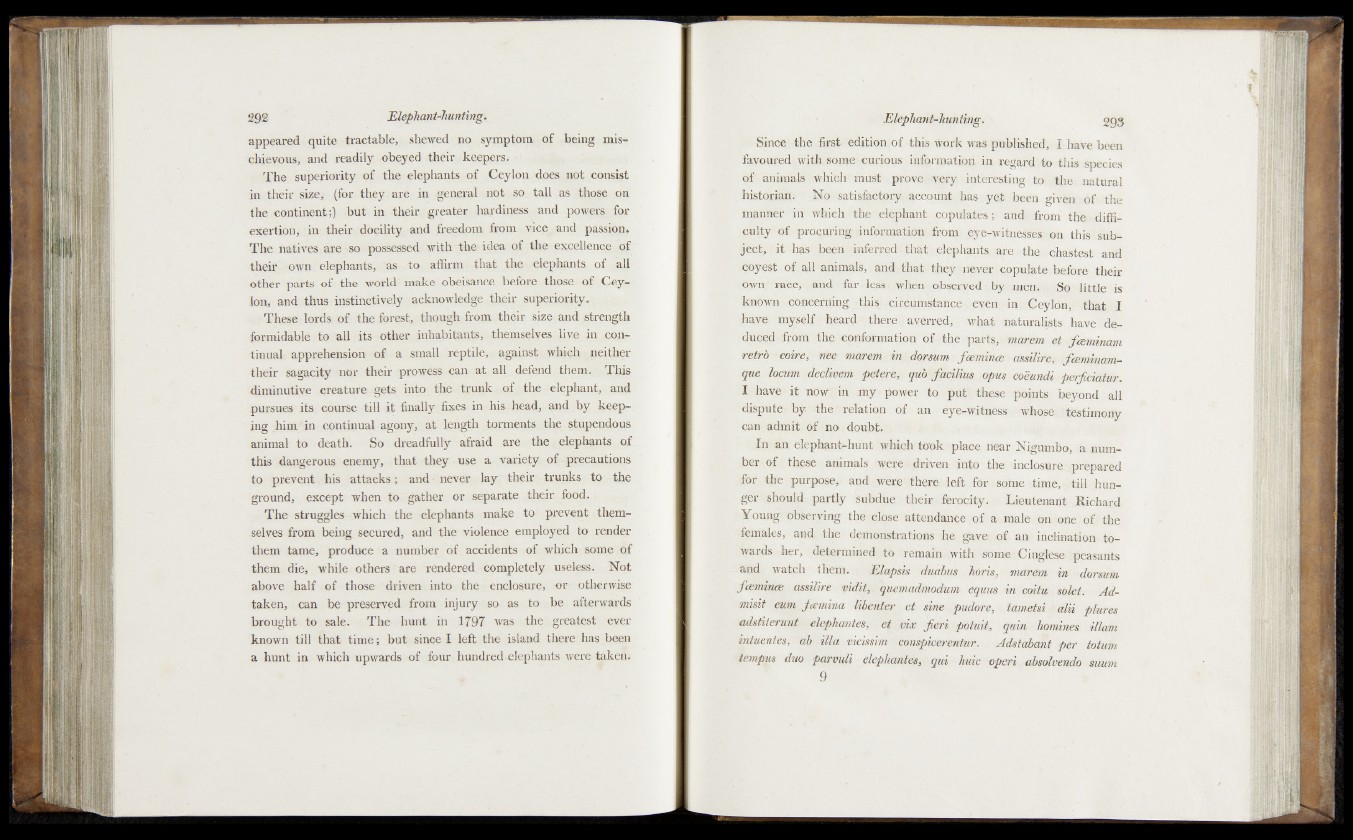
appeared quite tractable, shewed no symptom of being mischievous,
and readily obeyed their »keepers. | |
. ffhe superiority; ®£ the elephants of Ceyton.:d o ^ , not consist
in their sise* (for; th ey ; are in general not so tall as tliQse °P
the continent;) but in their, greater hardiness and powerg; for
. .their; « k L frQW1 v-ice^and passion.
The natives are so possessed - fitb'rthe- idea of |the;'excellenGe»:|of
their own elephants, .as to affirm that the elepfap-ntg of 'all
other parts of the world' make' obeisance before those-o^ Gey?
Ion, and thus instinctively acknowledge their superiority.
These lords of1 theJjrigst,, though, from their, size and strength
formidable to all its other inhabitants, .themselves live, ip .cop-
tin ual apprehension o f a small 'reptile,,. against ;which^neither
their sagacity nor their prowèss can at all defend/thejaóï, This
diminutive creature-gets into the trunk ,o f| the elephant, and
pursues its course till it finally fixes in his. head* and by keeping
him in continual agony, at length torments the stupendous
animal to death. So dreadfully afraid are th e : elephants of
this dangerous enemy, that they use a variety pfi^precautions
to prevent;, his attacks; and - never lay their trunks to the
ground, except when to father or separate their food. r ,
The struggles which the elephants make to prevent themselves
from being secured, and the violence-employed to render
them tame, produce a number of accidents of . which some pf
them die/ while others are rendered, gon^letely nseksS; Not
above half of those driven into the enclosure, -or- otherwise
taken, can be preserved from injury so as to be afterwards
brought to sale. The hunt in 1797 was the greatest ever
known till that time; but sinee I left the island: there has been
a hunt in which upwards of four hundred-elephants were teken'.
H Jsunee'/the .first- edi tippy of -«this fo rk was published,- I have been
favomfed^wifk, some curious lis^rpaatioh, ip regard to this Species
o f • unimak. which to the natural
historian'. " ,If©^satisfectgr|^^ccoiaa,t has iy#i been giv§®t,Gfitbe
mariner ip #hiclv^hCi'elephant uco^uptesh^ andfufi;om thfr* difficulty
o f procuring -infor-matknvfeom ^p-rifitness'fe^ioa this:iffib-
.jec,tj ? it ffias be.eft ^«Igphjantsqare .»the chastest and
.'impest of all animals, and-Ethat theyf never qppulatecbpfoase their
Own* race,' and far.Jess^jWhen observed by mem | -Sq little is
known,pfioricerffing -this; circumstance Severn in&fpeyldp^ that ft
haye- myself heard-*/there,* averred, / what f^turalists have -deduced
from the conformation o £ $ te p a r ts , marem etrfeermnam
retrb -toire, nte* marem in dorsum \ foemirke ■ assilire, jaeminam-
que locum declmem petere,- qubtfucilim opus copmdi .perfidatnr.
I bavfe' it now in my-power to-put'* &ese points beyond ffil
dispute- by.* 4he ‘Relation' of an ey e ^ tp e ss/,, »whose testimony
can admit of - no doubt.
T# an elephant-hunt whichtook splice, near Nigumbo, a num-
ber-.df g thpse animus were ,dti*en into the iiwdosure; .prepared
Sot -the purpose,- and were there left for som e -tim e,till-h u n ger
should partly $ubdue their/«krocity. Lieutenant Richard
/Young "Observing the close attendance of a male- on one of the
fipriaks, and; the demonstrations he gave>;of an inebnation towards
her, determined to remain with .some ‘ Cinglese. ^peasants
and watch them. Elapsis duabus horis, marem in dorsum
feeminiB assilire vidit, .' quemadmodum equus in ooitu | sblet. Ad-
m isit eum Jeemina libenter et sme^pitdom U m ^si ? p lum
adstitemnt- dephantes, et m s fam p o ttM ) quin bomines illam
mtuentes, ab ilia viemim conspicerentur.. Adstabant -per totum
tempus dm parvuli elephante&y qui huic operi abs&lvendo
9
mum